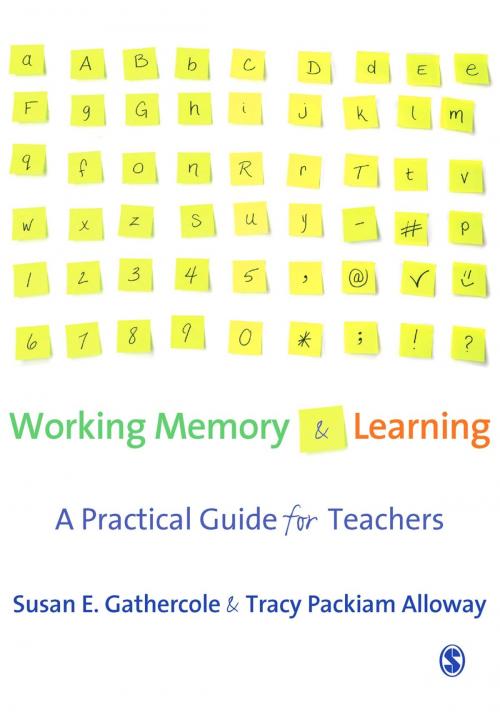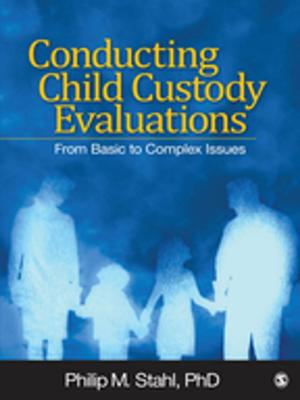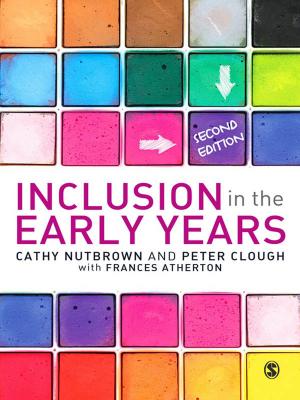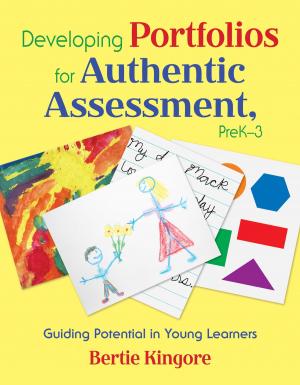Working Memory and Learning
A Practical Guide for Teachers
Nonfiction, Reference & Language, Education & Teaching, Special Education, Learning Disabled| Author: | Tracy Packiam Alloway, Susan Gathercole | ISBN: | 9781446200155 |
| Publisher: | SAGE Publications | Publication: | January 9, 2008 |
| Imprint: | SAGE Publications Ltd | Language: | English |
| Author: | Tracy Packiam Alloway, Susan Gathercole |
| ISBN: | 9781446200155 |
| Publisher: | SAGE Publications |
| Publication: | January 9, 2008 |
| Imprint: | SAGE Publications Ltd |
| Language: | English |
Dr Tracy Alloway has been awarded the prestigious Joseph Lister Award from the British Science Association.
'The authors have written a guide for practitioners that is both highly practical, and yet based upon sound theoretical principles….This book achieves a successful, yet often elusive, link between theory, research and practice, and deserves to have a high readership. I will have no hesitation in recommending it to a range of readers' - Jane Mott, Support for Learning
'This book fulfils its aim to explain working memory and the limits it places on children's classroom learning. For teachers it gives a very clear guide and fills a gap in understanding that can only lead to more child-centred approaches to teaching and learning' - Lynn Ambler, Support for Learning
'A clear and accessible account of current theory and research, which is then applied to children's learning in the classroom....The range of strategies...are well grounded in theory derived from research and sit within a coherent conceptual model' - The Psychologist
'An easy to read yet informative book that explains the concepts clearly and offers practitioners ways to support those with poor working memory in the classroom' - SNIP
`The topic of working memory nowadays tends to dominate discussions with teachers and parents, and both groups can helpfully be directed to this easy-to-read but serious text … (it) is likely to prove a turning-point in the management and facilitation of hard-to-teach children. In a situation muddied by ever-multiplying syndromes and disorders, this book delivers a clarifying and reassuring isolation of the major cognitive characteristic that cuts across all the boundaries and leaves the class teacher and SENCO empowered. I think very highly of the book and shall be recommending it steadily' - Martin Turner, Child Center for Evaluation and Teaching, Kuwait
Susan Gathercole is winner of the British Psychological Society's President's Award for 2007
A good working memory is crucial to becoming a successful learner, yet there is very little material available in an easy-to-use format that explains the concept and offers practitioners ways to support children with poor working memory in the classroom.
This book provides a coherent overview of the role played by working memory in learning during the school years, and uses theory to inform good practice.
Topics covered include:
- the link between working memory skills and key areas of learning (such as literacy & numeracy)
- the relationship between working memory and children with developmental disorders
- assessment of children for working memory deficits
- strategies for supporting working memory in under-performing children
This accessible guide will help SENCOs, teachers, teaching assistants, speech and language therapists and educational psychologists to understand and address working memory in their setting.
Dr Tracy Alloway has been awarded the prestigious Joseph Lister Award from the British Science Association.
'The authors have written a guide for practitioners that is both highly practical, and yet based upon sound theoretical principles….This book achieves a successful, yet often elusive, link between theory, research and practice, and deserves to have a high readership. I will have no hesitation in recommending it to a range of readers' - Jane Mott, Support for Learning
'This book fulfils its aim to explain working memory and the limits it places on children's classroom learning. For teachers it gives a very clear guide and fills a gap in understanding that can only lead to more child-centred approaches to teaching and learning' - Lynn Ambler, Support for Learning
'A clear and accessible account of current theory and research, which is then applied to children's learning in the classroom....The range of strategies...are well grounded in theory derived from research and sit within a coherent conceptual model' - The Psychologist
'An easy to read yet informative book that explains the concepts clearly and offers practitioners ways to support those with poor working memory in the classroom' - SNIP
`The topic of working memory nowadays tends to dominate discussions with teachers and parents, and both groups can helpfully be directed to this easy-to-read but serious text … (it) is likely to prove a turning-point in the management and facilitation of hard-to-teach children. In a situation muddied by ever-multiplying syndromes and disorders, this book delivers a clarifying and reassuring isolation of the major cognitive characteristic that cuts across all the boundaries and leaves the class teacher and SENCO empowered. I think very highly of the book and shall be recommending it steadily' - Martin Turner, Child Center for Evaluation and Teaching, Kuwait
Susan Gathercole is winner of the British Psychological Society's President's Award for 2007
A good working memory is crucial to becoming a successful learner, yet there is very little material available in an easy-to-use format that explains the concept and offers practitioners ways to support children with poor working memory in the classroom.
This book provides a coherent overview of the role played by working memory in learning during the school years, and uses theory to inform good practice.
Topics covered include:
- the link between working memory skills and key areas of learning (such as literacy & numeracy)
- the relationship between working memory and children with developmental disorders
- assessment of children for working memory deficits
- strategies for supporting working memory in under-performing children
This accessible guide will help SENCOs, teachers, teaching assistants, speech and language therapists and educational psychologists to understand and address working memory in their setting.















